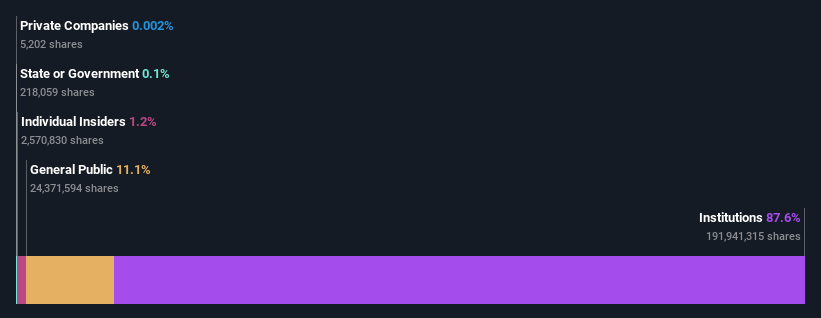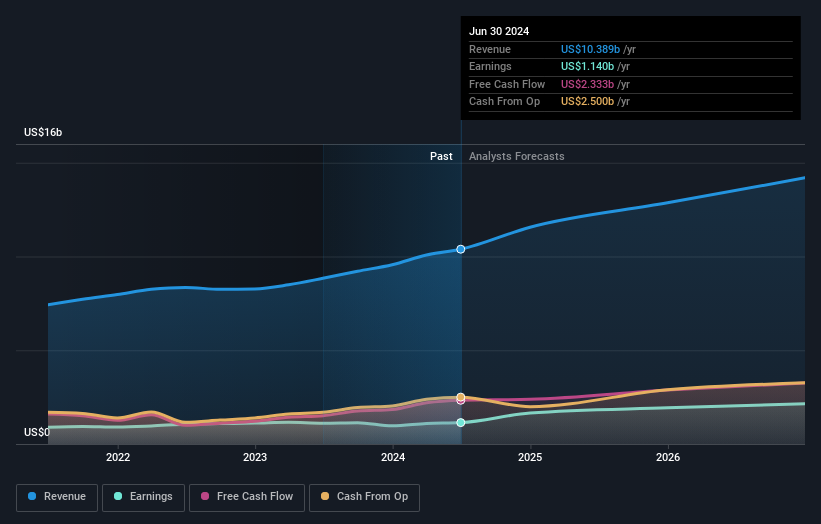Key Insights
- Given the large stake in the stock by institutions, Arthur J. Gallagher's stock price might be vulnerable to their trading decisions
- A total of 14 investors have a majority stake in the company with 50% ownership
- Recent sales by insiders
If you want to know who really controls Arthur J. Gallagher & Co. (NYSE:AJG), then you'll have to look at the makeup of its share registry. We can see that institutions own the lion's share in the company with 88% ownership. Put another way, the group faces the maximum upside potential (or downside risk).
Since institutional have access to huge amounts of capital, their market moves tend to receive a lot of scrutiny by retail or individual investors. Therefore, a good portion of institutional money invested in the company is usually a huge vote of confidence on its future.
Let's take a closer look to see what the different types of shareholders can tell us about Arthur J. Gallagher.

What Does The Institutional Ownership Tell Us About Arthur J. Gallagher?
 Many institutions measure their performance against an index that approximates the local market. So they usually pay more attention to companies that are included in major indices.
Many institutions measure their performance against an index that approximates the local market. So they usually pay more attention to companies that are included in major indices.
Arthur J. Gallagher already has institutions on the share registry. Indeed, they own a respectable stake in the company. This can indicate that the company has a certain degree of credibility in the investment community. However, it is best to be wary of relying on the supposed validation that comes with institutional investors. They too, get it wrong sometimes. It is not uncommon to see a big share price drop if two large institutional investors try to sell out of a stock at the same time. So it is worth checking the past earnings trajectory of Arthur J. Gallagher, (below). Of course, keep in mind that there are other factors to consider, too.

Investors should note that institutions actually own more than half the company, so they can collectively wield significant power. Arthur J. Gallagher is not owned by hedge funds. Looking at our data, we can see that the largest shareholder is The Vanguard Group, Inc. with 12% of shares outstanding. With 7.9% and 7.6% of the shares outstanding respectively, BlackRock, Inc. and Capital Research and Management Company are the second and third largest shareholders.
A closer look at our ownership figures suggests that the top 14 shareholders have a combined ownership of 50% implying that no single shareholder has a majority.
While it makes sense to study institutional ownership data for a company, it also makes sense to study analyst sentiments to know which way the wind is blowing. Quite a few analysts cover the stock, so you could look into forecast growth quite easily.
Insider Ownership Of Arthur J. Gallagher
The definition of an insider can differ slightly between different countries, but members of the board of directors always count. Company management run the business, but the CEO will answer to the board, even if he or she is a member of it.
I generally consider insider ownership to be a good thing. However, on some occasions it makes it more difficult for other shareholders to hold the board accountable for decisions.
Our most recent data indicates that insiders own some shares in Arthur J. Gallagher & Co.. Insiders own US$740m worth of shares (at current prices). It is good to see this level of investment. You can check here to see if those insiders have been buying recently.
General Public Ownership
The general public, who are usually individual investors, hold a 11% stake in Arthur J. Gallagher. This size of ownership, while considerable, may not be enough to change company policy if the decision is not in sync with other large shareholders.
Next Steps:
It's always worth thinking about the different groups who own shares in a company. But to understand Arthur J. Gallagher better, we need to consider many other factors. For instance, we've identified 3 warning signs for Arthur J. Gallagher that you should be aware of.
But ultimately it is the future, not the past, that will determine how well the owners of this business will do. Therefore we think it advisable to take a look at this free report showing whether analysts are predicting a brighter future.
NB: Figures in this article are calculated using data from the last twelve months, which refer to the 12-month period ending on the last date of the month the financial statement is dated. This may not be consistent with full year annual report figures.
Have feedback on this article? Concerned about the content? Get in touch with us directly. Alternatively, email editorial-team (at) simplywallst.com.
This article by Simply Wall St is general in nature. We provide commentary based on historical data and analyst forecasts only using an unbiased methodology and our articles are not intended to be financial advice. It does not constitute a recommendation to buy or sell any stock, and does not take account of your objectives, or your financial situation. We aim to bring you long-term focused analysis driven by fundamental data. Note that our analysis may not factor in the latest price-sensitive company announcements or qualitative material. Simply Wall St has no position in any stocks mentioned.
